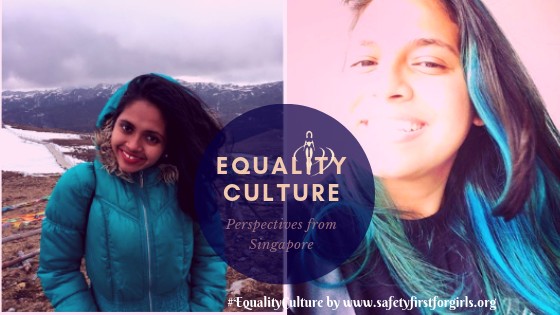Indonesia Equality Culture
Podcast 2 by Namira Samir via UN Online Volunteers
Article written by Steffica Warwick, SAFIGI Editor
Recap on Equality Culture from India, Kenya and Sudan by clicking here.
EQUALITY CULTURE PERSPECTIVES FROM INDONESIA
LISTEN IN ON: POSITIVE CULTURAL ASPECTS
LISTEN IN ON: NEGATIVE CULTURAL ASPECTS
ABOUT EQUALITY CULTURE
Equality Culture is a podcast by SAFIGI Outreach Foundation (Safety First for Girls). The discussions on the intersection between Culture and Gender Equality build on SAFIGIs goal for SDG 5 - gender equality and equity, and SDG 11- safer cities. Safety of girls begins with a safe space to talk about what is working in our culture and what needs to be improved.
Culture and various traditions play an integral part of a people who share common everyday experiences. It is a unifying factor which gives each group an identity and sense of belonging detailing the rich history of where people originated from. Many fight and die to preserve their culture and traditions. With globalization, environmental changes and development consistently spreading globally, it has become apparent that some traditional practices promote equal thriving of human beings while others pose a threat to equality and the upholding of human rights.
The #EqualityCulture discussions from across the globe will challenge us to think critically about equality from views of different cultures, thereby creating a first step to a more equal and safer world while embracing our unique values.
This project also aims at bringing volunteers from across the globe to experience a cultural exchange and identify positive traditions as well as speak with one voice supporting the empowerment of females regardless of where you live or what you look like.
Article written by Steffica Warwick, SAFIGI Editor
Recap on Equality Culture from India, Kenya and Sudan by clicking here.
EQUALITY CULTURE PERSPECTIVES FROM INDONESIA
LISTEN IN ON: POSITIVE CULTURAL ASPECTS
LISTEN IN ON: NEGATIVE CULTURAL ASPECTS
Equality culture - Indonesia perspectives
Gender equality culture in Indonesia
In Indonesia, there is still a negative culture
whereby men have control over women’s actions and decisions. This should be
campaigned against, to show that women can do as much as men.
There is also the belief that girls do not need
as much education as men, and that they should have their decisions made for
them.
Other commonly held beliefs, such as that women
are not as capable leaders as men, should be challenged at a cultural level.
Women can work with their minds and their hearts simultaneously.
How women can be empowered
Women can be empowered in many different ways.
What she lacks in one way (such as economic empowerment), she can be empowered
in another way (such as education).
Women need more opportunities to be empowered,
and this does not necessarily mean with a career. It means being able to do
things for herself and for her family. Women can empower themselves by doing
things or making small changes, such as actively using their social media. If
women see problems, they need to take steps towards changing them. This also
means speaking their minds.
Policies in Indonesia
The gender pay gap does not exist in Indonesia.
There is also maternity leave, which some countries do not have. The Ministry
of Finance have acknowledged the role of women in the economy, and progress has
been made at a political level towards gender equality. But in order for
justice to be fair and more equal, there must be female judges and reforms in education.
Education is the best way to empower a woman, and make her useful for her
community, environment and society.
In summary, there is much room for growth for
gender equality in Indonesia. Women can take steps to empower themselves, to
make way for the next generation of female leaders.
ABOUT EQUALITY CULTURE
Equality Culture is a podcast by SAFIGI Outreach Foundation (Safety First for Girls). The discussions on the intersection between Culture and Gender Equality build on SAFIGIs goal for SDG 5 - gender equality and equity, and SDG 11- safer cities. Safety of girls begins with a safe space to talk about what is working in our culture and what needs to be improved.
Culture and various traditions play an integral part of a people who share common everyday experiences. It is a unifying factor which gives each group an identity and sense of belonging detailing the rich history of where people originated from. Many fight and die to preserve their culture and traditions. With globalization, environmental changes and development consistently spreading globally, it has become apparent that some traditional practices promote equal thriving of human beings while others pose a threat to equality and the upholding of human rights.
The #EqualityCulture discussions from across the globe will challenge us to think critically about equality from views of different cultures, thereby creating a first step to a more equal and safer world while embracing our unique values.
This project also aims at bringing volunteers from across the globe to experience a cultural exchange and identify positive traditions as well as speak with one voice supporting the empowerment of females regardless of where you live or what you look like.




Comments
Post a Comment